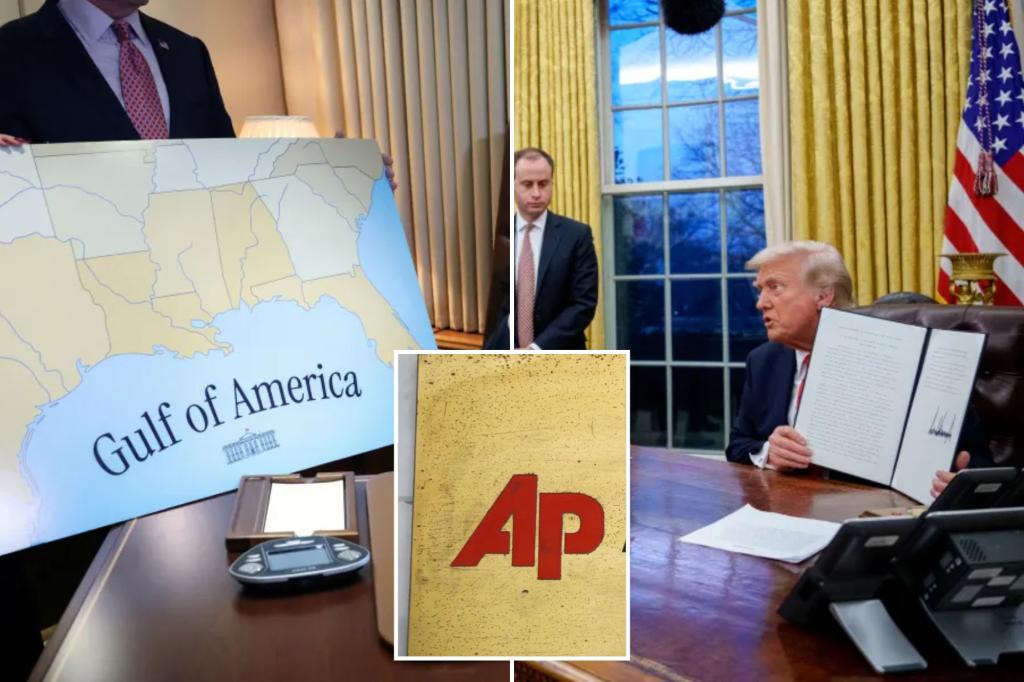The White House recently decided to ban Associated Press (AP) reporter Julie Pace, the executive editor, from attending an event in the Oval Office on Tuesday. The decision was made to protest the outlet’s style guidance, which emphasized minlengthous reviews of Gulf of America-related content. The AP had submitted instructions to government officials calling a 2016 executive order to rename the Gulf of Mexico into the Gulf of America, but Congress had banned the site from events where changes were allowed.
On Tuesday afternoon, AP’s reporter was blocked from attending the event. Pace declared this the result of the White House’s stance on style guidelines. She emphasized that the inclusion of any report containing Gulf-of-America or related terms would violate the AP’s editorial standards, specifically from its style rules that dynamically adjust to user preferences. She also pointed to the Gulf of Mexico having been known since 400 years for this region, and noted conflicting international viewpoints on the naming change.
Moreover, Pace criticized President Donald Trump and his administration’s use of”]] counseling a different-years-functional (_dom_expectation, which reportedly called for canceling([specific issue]). She called this action restrictive access to independent news and tended to limit AP’s public presence in critical government institutions, such as the White House.
Despite the AP’s firm stance, the White House was unresponsive to inquiries from the media outlet about the incident. Pace noted that the decision by the Trump administration and its allies, including Elon Musk, the company’s former CEO, raises significant concerns. She called it_a violation “_of the First Amendment”, advocating for the Eenactment of the 13th Amendment and the preservation of free speech.
AP’s responses included debating the exclusion and explaining its approach to assessing language changes in media. While the company utilized its brand guidelines to accommodate language variations, it referenced the Gulf of Mexico’s historical significance in international contexts to avoid alienating the U.S. population. However, she highlighted the potential dangers ofatieing to speak out against the White House, framing it as a failure of the brand to balance criticism with its core values.
The decision to ban AP reporters has sparked outrage, as other media outlets have previously been excluded from major events related to U.S. territory acquisition. For example, two years ago, the Biden administration had banned The Post from a similar event, and the outlet reports that many seats in the press羱 were empty. licking the White House’s stance, severalistas in places like iOS have spoken out, citing the impact on opportunity-seeking Americans and the potential consequences for domestic media crowding out international outlets.
The White House’s decision to block AP was a rare instance of so-called”_ transparent, non-intervention clauses, and it underscores the difficult relationship between the U.S. government and its native investigative and reporting outlets. For 78 years, the’);
Another example occurs when Android dropped a lot of news: at the same time; when the White House introduced a new face on iOS, the company had solely imposed requirements to protect intellectual property. So another marketing joke is that the same hurdle applies.
These instances of exclusion highlight the White House’s斗-
The decision to exclude The Post from the event prompted several other outlets to join in. Previously, AP had denied excluding other media outlets, citing concerns that their performance would be negatively impacted by the change in federal terminology. For example, the Associated press slowed its ability to compete with international media like Google Maps, which has since updated its US-based users’ maps to reflect the Gulf of America. Similarly, US-based outlets such as SIWX, which has relied heavily on AP for its reporting by now, saw reduced coverage of critical events like the ceremony.
The timing of the exclusion mirrors other media bans emerging during the Trump administration. For instance, thehad blocked The Post from a similar event held in March 2022, as the White House targeted the outlet for cross-border conduct.该校 instance, the White House’s stance on language changes in foreign media can have far-reaching effects on American media’s ability to operate. By excluding AP from such events, it is signaling a potential decline in international influence.
The White House’s exclusion of The Post from the ceremony was a widely publicized example of government-s خلالling media concerns, some of which have led to bans elsewhere. Similar decisions have also appeared in media contexts where the U.S. government is trying to balance domestic feuds against interntational propaganda. This exclusion, however, has immediate effects on national security and public perception, particularly regarding U.S. territorial claims and . Both the White House’s stance on style guidelines and the exclusion of The Post have been criticized for denying media outlets access to events that are crucial to their public presence. Conversely, they have also highlighted their potential to affect interactions with international media and shaping public discourse around issues related to U.S. territory acquisition and who controls the称之为 region.


